LEXICOGRAPHY PUBLICATIONS
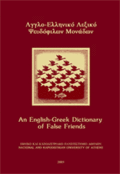
AN ENGLISH-GREEK DICTIONARY OF FALSE FRIENDS
The English-Greek Dictionary of False Friends was compiled by the first group of students accepted to do the MA in "Lexicography: Theory and Applications". Specifically, under the guidance of their instructors, the students undertook the task of writing entries for over 1.000 lemmas, in partial fulfillment of the requirements for the course entitled "Lexicography and Translation" as well as their MA theses. The dictionary was published by the University of Athens and is the first of its kind for the English-Greek language pair, as this was the first time that the relevant area was extensively researched and fully exploited in practice in Greece.
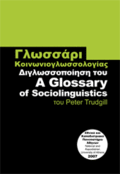
A GLOSSARY OF SOCIOLINGUISTICS
The Glossary of Sociolinguistics is in effect a bilingualised version into Greek of Peter Trudgill's work by the same title (Edinburgh University Press, 2003). P. Trudgill's glossary was rendered into Greek by the second group of students accepted to do the MA in "Lexicography: Theory and Applications". Bilingualization of this book was researched and effected in the context of the course "Lexicography and Translation: Bilingual Specialized Dictionaries". The glossary consists of lemmas directly related to sociolinguistic research, for a vast number of which there was either no Greek equivalent or more than one candidate terms suggested in the work of various researchers. It includes terms for a number of sociolinguistic topics and a great variety of issues relating to diverse languages and dialects. The main aim of the biligualised version is to serve as a useful tool for Greek students of Linguistics or other members of the public interested in sociolinguistic subjects. The glossary was published by the University of Athens.
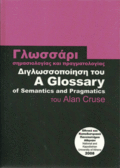
A GLOSSARY OF SEMANTICS AND PRAGMATICS
The Glossary of Semantics and Pragmatics is a bilingualised version into Greek of Alan Cruse's work by the same title (Edinburgh University Press, 2006). The glossary was bilingualised by the third group of students accepted to do the MA in "Lexicography: Theory and Applications", in the context of the course "Lexicography and Translation: Bilingual Specialized Dictionaries". The lemmas are drawn from a wide range of semantic and pragmatic theories and diverse approaches to meaning research. The main aim of the endeavour was to provide a useful tool for both Greek linguistics students and members of the general Greek public interested in language meaning and use. The glossary was published by the University of Athens.
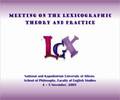
MEETING ON THE LEXICOGRAPHIC THEORY AND PRACTICE
A CD containing selected presentations of the conference organized by the MA in "Lexicography: Theory and Applications" in November 2005.
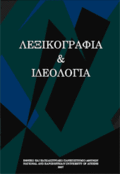
LEXICOGRAPHY AND IDEOLOGY
The essays included in this volume examine the relation between lexicography through the analysis of a variety of dictionaries, both past and present. Contributors connect lexicography with critical theory in their interpretation and cultural readings of specific lemmata, approaching the dictionary through the perspective of literary theory.
This attempt was made in the context of the postgraduate seminar on "Literary Theory and Lexicography", which was taught in the interdepartmental postgraduate program on Lexicography.
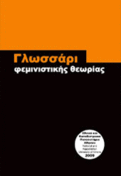
A GLOSSARY OF FEMINIST THEORY
This glossary includes terms from the field of feminist theory and criticism as well as the broader area of gender studies and its contribution to literary criticism. As no such dictionary exists in the Greek language, the terms used in feminist theory and in feminist literary criticism have been so far translated quite inconsistantly. The glossary intends to fill this void through the compilation of approximately 100 such terms, contributing at the same time to a research project involving many researchers at the National and Kapodistrian University of Athens, the electronic lexicon Fylopaedia which serves as a self-learning tool for students interested in gender studies.
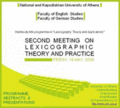
SECOND MEETING ON LEXICOGRAPHIC THEORY AND PRACTICE
A CD containing the presentations of the conference organized by the MA in "Lexicography: Theory and Applications" in May 2008.